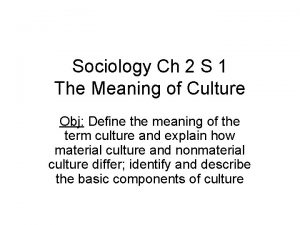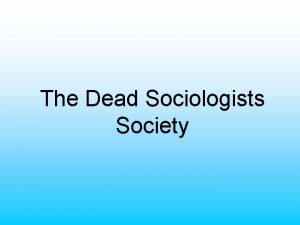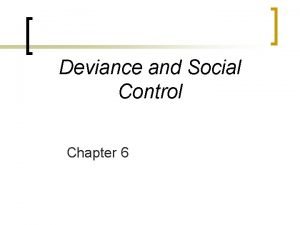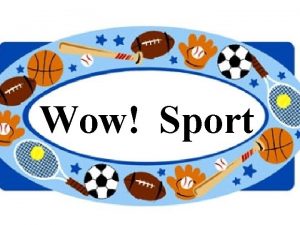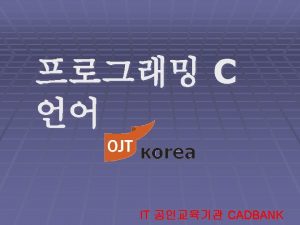The Nature of Sport Sociologists define sport as












- Slides: 12

The Nature of Sport Sociologists define sport as a set of competitive activities in which winners and losers are determined by physical performance within a set of established rules. It has become a social institution that fills several societal needs. l Sport teaches some of the basic values of society. l It promotes attachment to society. l Sport helps individuals identify with society. 1

Sport, Culture, and Society Sport plays a central role in American society in part because it reflects the culture’s emphasis on achievement. l The prevailing American view of sport is the one expressed by the late Vince Lombardi: “Winning is not everything. It is the only thing. ” l Sport mirrors society. Males dominate the sports world as they do other aspects of American society. l A sport subculture is a group within the larger context of sport that has some of its own distinct roles, values, and norms. 2

Theoretical Perspectives and Sport is a major social activity through which culture is created and reinforced. l Although sociologists agree that sport mirrors society, they disagree over the social implications of sport. l Sport sociologist Stanley Eitzen has written a book on the paradoxes, or contradictions, of sport in America. 3

Functionalism Functionalists view sport positively because it performs the following functions: l Sport teaches basic beliefs, norms, and values. l Sport promotes a sense of social identification. l Sport offers a safe release of aggressive feelings generated by the frustrations, anxieties, and strains of modern life. l Sport encourages the development of character. 4

What are the social dysfunctions of sport? Functionalists have identified some drawbacks to sport. l Because it reflects society, sport draws on achievement-oriented values that can be intensified to an extreme degree. l When achievement and winning come to be seen as the primary goals of sport, any method of winning–including violence and cheating–may be encouraged. 5

Conflict Theory l Conflict theorists believe that organized sport can harm character development. l To conflict theorists, sport is a social institution in which the most powerful oppress, manipulate, coerce, and exploit others. l While functionalists see sport as contributing to the unification of society, conflict theorists do not. l The contribution sport makes in forming good character is also questioned by conflict theorists. 6

Symbolic Interactionism Symbolic interactionists focus on the self-concepts and relationships developed through sports activity. l It contributes to our understanding of sport as a social institution. l This theoretical perspective concentrates on personal meanings, social relationships, and selfidentity processes. l It is concerned with the symbols of sports, what they mean, and how they are interpreted. 7

What are some limitations of each perspective? Each theoretical perspective has limitations. l While the functionalists point out the positive and negative role of sport in society, they overlook the shift from societal well being to personal profit that has occurred. l Conflict theorists overlook sport’s positive contributions to society. l Symbolic interactionism fails to address the functions of sport in society or explore sport as it relates to power and social inequality. 8

Does sport promote social mobility? Participating in sport usually improves a person’s place in social stratification structure. l Whatever sport they play, college athletes tend to be better educated, earn more money, and have higher occupational prestige than their fathers. l Sport serves as a social class escalator for minorities. l Sport can serve as an upward mobility barrier for minorities because it emphasizes athletics over academics, depriving some of solid educations. 9

Sport and Racism The assignment of positions to players is a form of discrimination. l One sign of this discrimination shows up in stacking, where players are assigned to less central positions on the basis of race or ethnicity. l Fewer minority players are assigned to “central” positions that involve leadership and decisionmaking responsibilities. l Salaries are not awarded equitably. l Personal appearances and endorsements are not requested as often from minority athletes. 10 l Fewer positions of power are occupied by minorities.

Sexism in Sport l The cultural roots of sexism in sport date back to the ancient Greeks, and these gender definitions have survived for the 2, 500 years. l Greek gods were depicted as athletic, strong, powerful, competitive, rational, physical, and intellectual. l Many Greek goddesses were passive, beautiful, physically weak, supportive, unathletic, and sexually attractive. 11

What are some of the consequences of sexism? l Stereotypes have traditionally discouraged females from playing sports. l Sexism has denied females equal access to organized sports. l Women are still denied equal access to the power structure of sport. 12
 How do sociologists define sport
How do sociologists define sport Sociologists define a symbol as
Sociologists define a symbol as How sociologists view social problems: the abortion dilemma
How sociologists view social problems: the abortion dilemma Auguste comte suicide
Auguste comte suicide Sociologists who view law as an instrument of oppression
Sociologists who view law as an instrument of oppression What is research report
What is research report It concerns many sociologists
It concerns many sociologists Nature and nature's law lay hid in night meaning
Nature and nature's law lay hid in night meaning Determinace lidské psychiky
Determinace lidské psychiky Hình ảnh bộ gõ cơ thể búng tay
Hình ảnh bộ gõ cơ thể búng tay Ng-html
Ng-html Bổ thể
Bổ thể Tỉ lệ cơ thể trẻ em
Tỉ lệ cơ thể trẻ em

